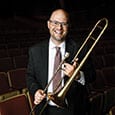Now in her 26th year at Traughber Junior High School in Oswego, Illinois, Rachel Maxwell believes that it is possible for any student to perform at the highest standards. “If they do keep playing after high school, that’s great, but it is more important to me that they come out of our program having an appreciation for excellence, digging in and tearing apart the composition, step-by-step methodical work, and understanding the value of that while being better consumers of fine arts. I want students to be stronger, better, more caring, and more understanding about the world around them. If they come out with this skill set, they are going to be good at everything. They can go into any career, understand how to go from point A to point B, and know how success looks and feels. No one can take the confidence from a student who knows how to do that.”
At Midwest, I presented a clinic titled Excellence and the Inclusive Ensemble. It received some criticism online prior to the convention from people saying, “I’m going to Midwest to hear the best of the best. I don’t want to hear this bleeding heart stuff.” To me this was a bit funny, because, while we joke and have fun in class, I am the last person to be a bleeding heart; we work until we get things down.
This is the secret to a great band: You teach all the students in front of you until they get things exactly right. We have all heard directors reminisce about the band from 2002 that was the best they ever had, but you don’t have that group anymore. Don’t let that affect your approach to this year’s students. Kids are kids. If you break concepts down, teach them, repeat, and model, every student in that room can learn and improve.
As you watched your students move to the high school program, what did you notice, and how did it change your perspective?
One thing I see frequently is middle-of-the-road students in junior high becoming strong players or leaders in high school. I think there is a danger in giving too little attention to the students who aren’t at the top, especially in junior high. Seventh and eighth graders aren’t finished – they are just starting. Some are already rock stars, and some will never be more than average performers, but some are late bloomers who become the foundation of the high school program.
This realization pushed me to pay more attention to the students who weren’t the best, to make sure they are not treated differently – and don’t feel like they are treated differently – than the top players. Teachers rarely know everything about their students’ lives. We don’t know what extent the family makes practicing – or schooling in general – a priority.
It is impossible to tell in beginning band what a student is going to be. Children change a lot between sixth and twelfth grade, often going through numerous personalities and interests. Teach to where you want them to be. They might not be the best players in junior high, but then the high school concert or jazz band sparks them, and they ask, “What do I need to do to be part of that?”
The other side of that is the students who breeze through junior high through sheer talent and only realize in high school that they have to pair that with hard work. Some of these students realize they like band better as a hobby, and they learn to be accept getting passed by the students who are working hard to excel.
If we truly believe that music education is good for every kid, then it is going to be especially good for lower-achieving students. Those are the children who need it for the long haul. Research about ability-based groupings in other content areas shows that when you ability track, there is not as much growth in the high-end kids, and there is almost no growth in the low-end kids, but when you mix those two populations the high-end kids still continue to develop but those middle- and low- kids improve along with them, so our focus has shifted over the last ten years.
.jpg)
How do you work with students who might have learning disabilities?
If you believe that special education students are going to hold you back and that ability-based bands are the only way to have an excellent ensemble, that is well and good for the programs that want to be ability based. I think every student, especially in the first years of band, deserves an outstanding experience. I don’t want anyone to feel like they never got a chance to shine or was never pushed because they were in an ability-based band.
A student who just graduated from high school had regular seizures and, diagnostically, a low IQ, but she mastered some first clarinet parts in my band. It wasn’t a sympathy chair; she earned it (plus, we rotate all our chairs anyway). We booked a concert at Chicago’s Orchestra Hall with a high school and a college, and there was no way I was going to exclude her.
I talked to her about how she was going to approach it, and she had a private teacher who helped quite a bit in preparation. In IEP meetings, her core teachers only talked about her limitations, but we saw her blow past every limitation based on her work ethic and her desire to be part of what everybody else is doing. Music might be the only time a student like her is on a team with honors and AP students. I think she accomplished so much because we told her she could and acted like it was normal. We gave her a part, told her to work on fingerings, tone, and good playing technique, and it never entered her mind that she couldn’t do it.
Where and how did you learn the importance of high expectations?
I was lucky to be in the honors program and take horn lessons as my honors track. This meant extra recitals and projects in the horn studio, which pushed me into what I felt would prepare me to take auditions. It wasn’t until my student teaching that I started liking band more than performing. I was a high-anxiety performer and didn’t have the tools to handle that at the time. I elected not to go to grad school and took a teaching job in West Aurora, Illinois instead.
Lily Fagan, my mentor there, showed me that students can do more than most people think and do it better than expected as well. Her approach was that there was a right way and a wrong way to do things, and we are going to do things the right way. This reminded me of the standards in drum corps and my college horn studio, and I knew that was the kind of band director I wanted to be.
.jpg)
Why do you set such high standards with young players?
Your standards determine your results. I think that what many directors need is confidence. People say things like, “I have a great band, but we don’t play—” and I ask them to stop. Stop aiming your goals toward the bottom end. Start supporting the bottom end and aim your goals past the top students. Everybody will come along. Not every student will get there at the same time or in the same way, but believe in your students. Some students will link arms and skip toward success, and other have to be dragged there. Invariably, the ones who have to be dragged realize success is more fun than they thought it was when they get there.
My approach is to expect the worst player in the section and the worst behaved student in the section to play and behave at a certain level that’s pretty close to the same level as anybody else. There is no room for poor playing or bad behavior. It is not what we do. This goes back to pedagogical expectations from day one – that you teach students how to sit, have a good embouchure, and hold their instrument correctly. We frequently joke, “We do things one way: the right way.” There is no reason to not do things the right way; no matter who you are, you can hold a trombone correctly and count to four.
The Chicago Symphony players are not sitting with their legs hooked on their chairs, bodies scrunched over, or elbows next to their body, nor do they play out the sides of their mouths. Good technique is the same at every level, and whether a young band has it comes down to a director’s grit and conviction that it can be mastered and that it will be revisited until it is done right. I tell them, “I’ve done this for like 30 years, so I know I can go longer than you on wanting it right,” but at the same time, it isn’t a war. Athletic coaches point out flaws in technique often, and it isn’t meant to be punitive. Students don’t get in trouble for sloppy technique; fixing it is just part of the job. However, it has to be packaged in a way that is personable and appealing to the students. Model often, make jokes, find a way to make a game of it. Never stop monitoring, and you will find you can fix a student’s posture with just a look. You will also find that students get to the point at which they want to do it correctly and are proud when they do.
People like to be successful and affirmed. They like to be part of something that’s positive. Make sure your students know you have their backs, and build on that. One thing I find myself saying often is “We do not baby you because I don’t think you’re babies. If you have adults that baby you, think about what that means. It is not a compliment. They treat you that way because that’s all they think you can handle. Show people you can handle more. We are tough on you and have expectations of you because we see greatness in you. We know you can do this even if you don’t believe it.” The highest regard I can have for children is holding them to this incredible standard.
It is dangerous to tell students the right thing once and then move on. It is not enough to say, “You need to fix that note. You need to look that note up. The intonation on that note is not good.” Not only do you have to identify the error, but you have to diagnose why it is happening and how to fix it. Then you have to put the physicality of it into words the child understands, and until you get a student to play it correctly, there is no teaching going on. Too many people stop at the diagnosis.
Are there ways teachers can err with the standards they set?
I see people shoot themselves and their program in the foot by making the expectations too high. I’ve thought about this for years. Logically, the next step for improving our quality would be to add sectionals. That is the biggest difference between what we do and all the Texas bands I observe that perform at Midwest. We do not have a sectional schedule now. The workaround is that we team-teach and also have a student teacher, so one of us can pull a section out of rehearsal as needed.
It is important to weigh who that next level of performance is for. It can be easy to fall into the trap of doing things for ourselves under the guise of doing them for our students. Will the seventh and eighth graders really benefit more from a Midwest performance than they are with the experiences they already have? The reality is that a Midwest performance would just be a feather in my cap. My students don’t know what Midwest is and are unlikely to see it differently than the other prestigious things we do.
If I added sectionals, I know what it would cost: I would lose the students who are in sports. Even just 90 minutes a week can make or break someone’s dedication to an activity. If I need to get things done that cannot be accomplished during the school day, then I need to pick different music or use our team teaching better. This is a wiser alternative than implementing something that would be a deal-breaker for some families.
Is time or money a bigger obstacle for band students?
It isn’t finances that make the playing field uneven, it is the parents’ attitude toward school that can make or break a child. There are likely students in every district who wanted to join band, and the parents’ response is, “Yeah, whatever.” They don’t enforce practice time or sign the child up for lessons. In other cases, the priority might be something other than music, but whatever the reason is, I don’t want to penalize anyone for not putting band first. It isn’t a priority for every family.
The cost has to be something that every family can reasonably afford. There are expectations for instruments and equipment, but we also have ways to support students through boosters and many school instruments that I’ve bought over the years. We are able to make sure that every student can reasonably participate in everything we do.
There were some old-school programs in which students were expected to make a serious commitment. These bands did amazing things, but every student had to take private lessons and invest in a certain instrument. That isn’t the reality for most children and families anymore, and the question facing teachers is whether they want to be the one to set up restraints so students don’t pick band or the one to open things up so students can be in band along with any other activities they might like.
I gently encourage private lessons but do not push hard because that is a financial and time commitment that not every family can make. If I force lessons, I am making decisions about how families spend their money and time, which is not my place.
What are reasonable expectations for parents of music students?
Well, it goes two ways. One is an overall family commitment to the program. My expectation for the time and money a family invests in the program has to be reasonable, as does the daily progress and workload. No one in my classroom is likely to love band as much as I do. Most parents are supportive, but some are indifferent, with the mindset that band is fine but not something they will be deeply into.
A few years ago, we were selected to perform at Midwest, the Illinois Music Educators Association Conference, and SuperState in the same year, in addition to our usual Prairie State performance. Because those first three were unexpected, I got some pushback from parents that it was too much. I tried to explain that it was like winning the lottery; you apply to all of these things and might make one of them every few years. What happened was abnormal, and I expressed thanks for accommodating, but the pushback made me think about over-scheduling performances. If there is too much, it can erode families’ trust in our decision making. If the expectations seem too heavy, we come across as unreasonable. The kids are usually up for anything, especially if a fast food stop is involved, but every event scheduled for outside the school day requires a sacrifice on the parents’ part.
How has remote teaching affected what you do?
It takes a lot of work to commit to helping every child have a degree of success. Remote teaching makes this exhausting. I was determined that every student was going to improve in some way. I don’t get paid to hang out with only the ten students who will practice no matter what. I am still trying to find that happy medium between working toward progress and being aware of how disappointed students must feel to be at home instead of with their friends at school.
It comes back to what I believe is best. I want as many students as possible in band, not just the ones who live and breathe band. The more students I can reach, the more value I have to the district, the more value our program has to the district. An inclusive program makes for a bigger platform to share ideas about growth and excellence.






